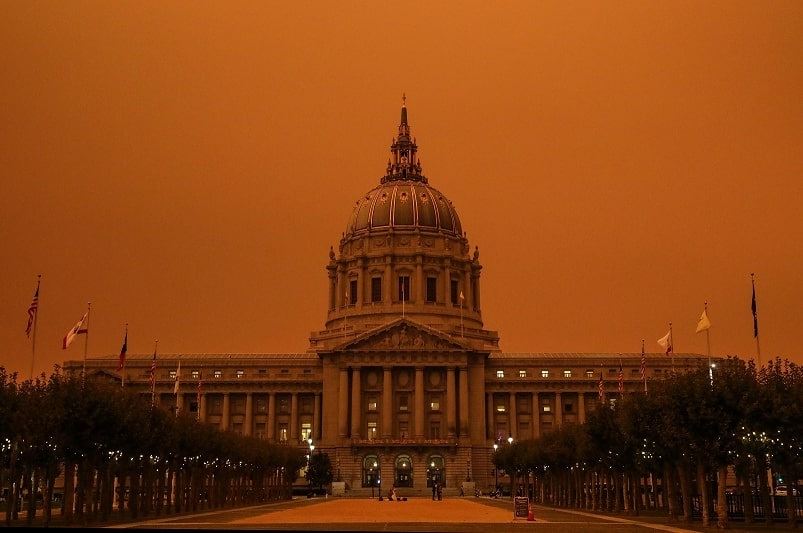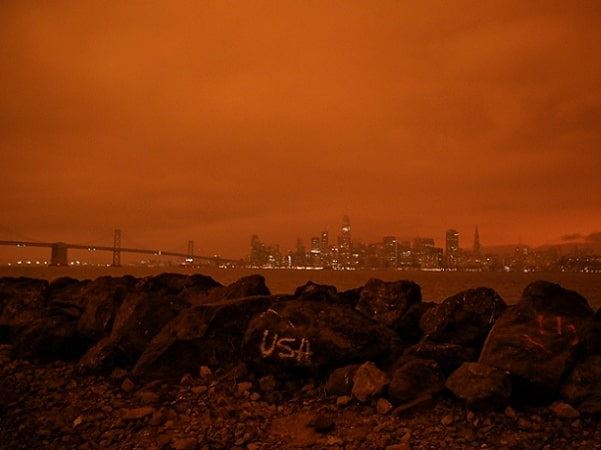Introduction: In this article, Gena Philibert-Ortega – who right now is experiencing California’s Dark Days caused by the raging wildfires – searches old newspapers to learn about New England’s Dark Day in 1780. Gena is a genealogist and author of the book “From the Family Kitchen.”
We live in a difficult time, and California is experiencing a lot right now. Sure, we are amid a worldwide pandemic which means that things aren’t “normal.” But in California, we’ve also had a record heatwave, and that heat exacerbated by dry conditions equals fires. Although I live approximately 50 miles from the nearest fire, the sky near my house was yellow for several days. In the San Francisco Bay Area, the sky is orange and day looks like night. A family member writes that “we have to turn the lights on inside and it’s about 15-20 degrees cooler than yesterday.”

This made me wonder if our ancestors ever experienced this sort of thing. The answer, of course, is found in GenealogyBank’s Historical Newspaper Archives.
A similar event happened 140 years ago in New England. California’s current orange sky and feeling of gloom and doom was experienced by New Englanders during the “Dark Day” of 1780. While we know what is causing California’s altered sky, New Englanders felt concern over something they didn’t understand – which led to fear and belief that it was God’s punishment or the end of the world.
Dark Sky over New England
The 19th of May 1780 was a terrifying day for New Englanders. By about mid-morning the skies had blackened. Eyewitness accounts of that day continued to be published decades later, including this one printed in 1853 in the Barre Patriot newspaper. Initially penned a week after the event, on 27 May 1780, this letter by Caleb G. Andrews to General Nathaniel Folsom recalls:
“In the morning it was rainy, till about 9 o’clock, when the clouds broke away and the sun appeared, but very red… at half-past ten it was uncommon dark, the clouds appearing of a yellowish hue. At 11, the public school was dismissed, it being so dark, that no person could read or write. It continued to grow dark till twelve, when it was so dark that we could not tell one person from another in a room with three large windows.”
In 1830, Hon. Wheeler Martin provided his recollection of the 19th of May 1780. He remembered:
“Where I resided at that time, the darkness at 11 o’clock was so great, that a candle was lighted and placed upon the table; –the fowls went to roost; –the sheep all huddled around in a circle, with their heads inward.”
He goes on to write that:
“The darkness was so great in the night time, that it was said by one Doctor Blackington… who had occasion to be out among his sick patients that night, that he could not see his white handkerchief placed before his eyes. The darkness was so thick that it could be felt.”
A Day to Remember
The “dark day” became one that people used to compare similar days, or even used to help give a sense of time. This 1786 mention of a weather event in Worcester is described as either a tornado or a hurricane:
“The whole horizon was soon obscured, and the darkness equaled, if not exceeded, that of the dark day in 1780.”
This obituary for Mrs. Elizabeth Burden, who achieved the advanced age of 103 years, references 1780’s dark day to indicate when she was last a practicing midwife:
“Her last practice in the obstetricate art was so late as the dark day, May 29 [sic], 1780.”
As you can probably guess, that wasn’t the only dark day in history (nor will it be the last). There were dark days prior to May 1780, as well as after. In fact, in 1780 the Boston Gazette published, just 10 days later, an article about a “dark day” in 1762. That day found the sky a “dirty yellow with green colour.” Aside from the color, “the air was almost suffocating, with a strong sulphurous smell.”
I was surprised by all the mentions of a “dark day” I found in the old newspapers, like this 1789 Lexington, Kentucky, version. It’s a good reminder that the weather and natural events affected our ancestors, and those events are important. Reading your ancestor’s local newspaper can help you better understand their life, and may also help as you seek to understand their correspondence, journals, or other writings.
The Fire of 1780
So, what caused New England’s dark day of May 1780? Like we are experiencing in California and the West Coast right now, it’s believed it was caused by forest fires and fog. Caleb Andrews’ letter in the Barre Patriot mentions “the strong smell of smoke.” According to an article by the New England Historical Society:
“Scientific research into old trees in the Algonquin Highlands, Ontario, concluded the Dark Day resulted from a massive wildfire in Canadian forests. Scientists found charcoal and resin – ‘fire scars’ — in the growth rings of the trees.”
A forest fire in Canada was something that would not have been apparent to those in New England living through the event in May 1780.*
Do you have an ancestor who experienced the Dark Day of 1780? What about other dark days? Have you documented it in your family history? Let us know about it in the comments below.
* “The New England Dark Day, May 19, 1780,” New England Historical Society (https://www.newenglandhistoricalsociety.com/new-england-dark-day-may-19-1780/: accessed 9 September 2020).
